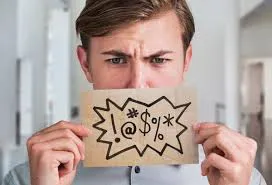
Can We Talk About Swearing?
Can we talk about swear words? For starters, I’m no saint. I confess to cussing, though thankfully few have heard me.
It may have started with minor hockey. When I messed the play or missed the puck, I’d swear to myself. (Mom aways threatened to wash my mouth out with soap if I ever swore out loud.) Then I got my drivers license. The late George Carlin, who once revealed the seven dirty words you can never say on television, said “You never really learn to curse until you learn to drive.”
Through the years as a man of the cloth, there were times when even the saints could coax a bad word under my breath. But in a world where simulated copulation is a street dance, it may seem strange to be upset with swearing. After all, we’ve come to accept it from all sources and sides, even elected officials. Remember Pierre Trudeau’s alleged mouthing of something like ‘fuddle duddle’ in Parliament? Or when then U.S. Vice President Joe Biden used an expletive in a private aside to Barak Obama after the health care victory … a word heard around the world thanks to a microphone and the Internet?
So why do we swear? The reasons are as varied as the vulgarity. Like laying on the horn of a car, we swear to express diverse messages and emotions from irritation to salutation. In Biden’s case, profanity was his expression of excitement at an historic legislative victory. In Trudeau’s case it was an expression of derision for his opponents.
Sometimes we swear to be heard swearing and confirm our coolness. Sometimes swearing is so habitual we don’t hear it anymore. Most often, we swear because the use of profanity in the moment is cathartic.
But whatever the reason, airing pungent language heretofore considered private is further evidence that the lines between private and public have all but disappeared. There’s more cussing on screen and in lyrics than ever before. Here’s my beef. If you have the luxury to sit down and craft a script or song, why use the same string of foul expletives? Is it laziness? Is the writer just parroting everyday parlance to convey authenticity? Why not seize the chance to express outrage or protest using other words?
Where is bad language leading us? Are we more liberated, or just coarser? We used to call profanity “colourful” language but the same old four-letter words repeated ad nauseam do not make much of a palette.
Rather than swear at someone, why not insult with the poetic luster of Cyrano de Bergerac or Shakespeare and thrust a literary lance to deflate the pompous or shout your rage? The object of your derision may miss the well-crafted insult and shout back a more deranged invective. But still …
I weep for our degraded dialogue. It almost makes me curse.
Under my breath of course.
Post a comment